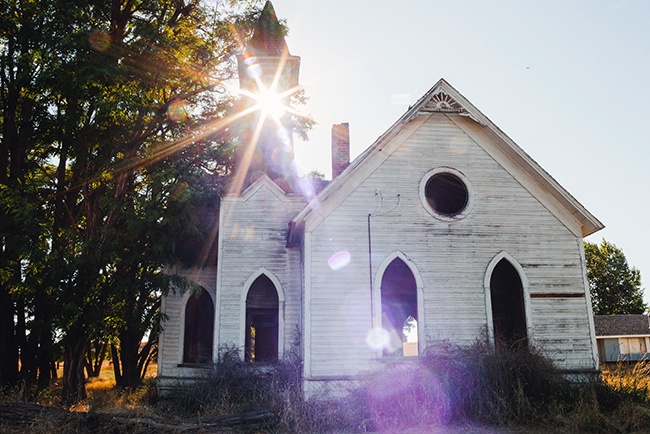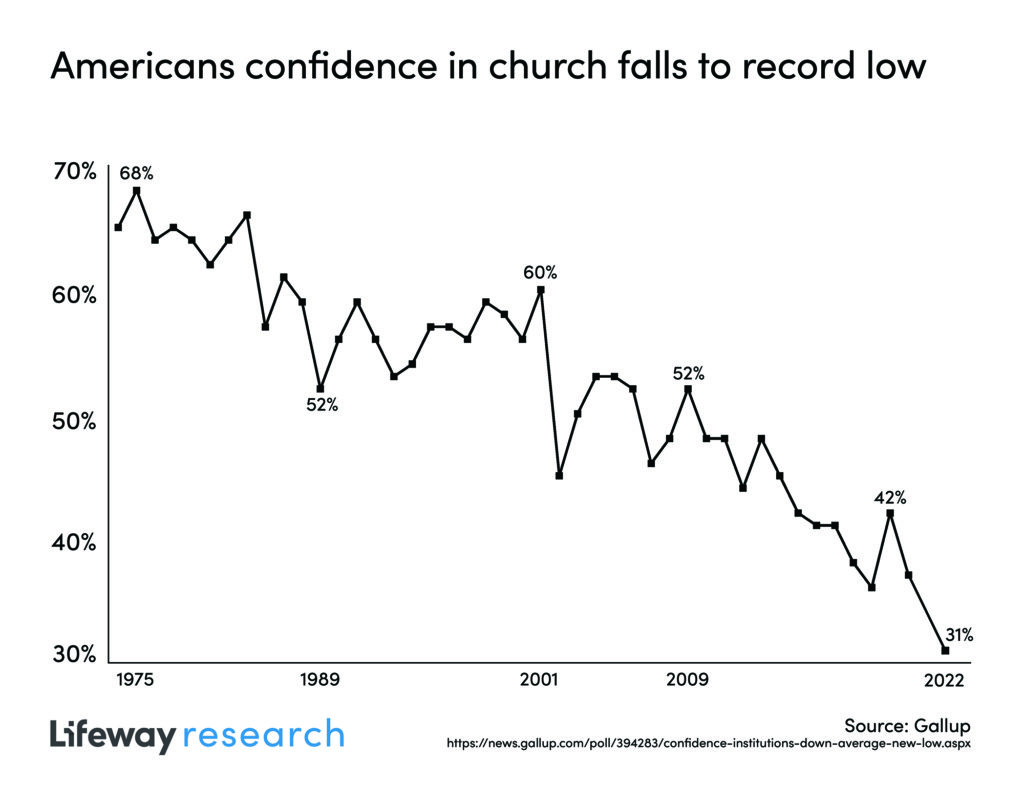
Americans increasingly don’t trust the church or pastors, as confidence and trust levels have eroded to historic lows for both.
By Aaron Earls
Americans may have positive associations with individual churches or pastors. However, thinking of them collectively, U.S. adults no longer offer them the benefit of the doubt.
Americans increasingly don’t trust the church or pastors, as confidence and trust have eroded to historic lows for the institution and its leaders.
Gallup’s most recent annual surveys on Americans’ institutional confidence and honesty ratings for professionals found trust in both the church and pastors reaching their lowest points in the history of the surveys.
Lack of confidence in the church
Gallup’s survey of confidence levels in institutions found significant declines for 11 of the 16 institutions, including the church or organized religion, and no improvements for any of the groups. Only two institutions, small businesses (68%) and the military (64%), garnered a great deal or quite a lot of confidence from a majority of Americans.
After dropping 5 points last year, the church suffered another 6-point fall in 2022. Currently, only 31% of Americans say they have quite a lot or a great deal of confidence in the church or organized religion, with just 14% expressing a great deal of confidence. Almost 2 in 5 Americans (37%) say they have some confidence in the church, while 29% say they have very little. Another 2% have none, and 1% have no opinion.
Only 31% of Americans say they have quite a lot or a great deal of confidence in the church or organized religion, a record low in Gallup's tracking poll. Click To TweetGallup first began tracking U.S. adults’ confidence in the church as an institution in 1973. In 1975, a high mark of 68% expressed a great deal or quite a lot of confidence in the church.
After a downward trajectory, the church experienced a boost of confidence in 2001, as most other national institutions did in the wake of the September 11 terrorist attacks, rebounding to 60% for the first time since 1987. That marked the last time at least 6 in 10 Americans had confidence in the church.

In 2009, 52% of U.S. adults said they had a great deal or quite a lot of confidence in the church as an institution. That was the last year a majority of Americans held that belief. In 2018, confidence levels dropped below 40% for the first time. They edged above that mark in 2020, only to fall back below in 2021 and now even further in 2022.
In addition to small businesses and the military, the church currently ranks behind the police (45%) and the medical system (38%), both of which also saw their confidence levels fall 6 points this year. Despite the drop in trust in the church, it still ranks above 11 other institutions in the latest survey, including public schools (28%), the Supreme Court (25%), newspapers (16%), and Congress (7%)—the only institution falling into the single digits.
Fewer U.S. adults 18 to 34 (26%) and 35 to 54 (27%) express confidence in the church compared to those 55 and older (36%), according to Gallup. Click To TweetSome demographic groups are more skeptical of the church than others. Politically, fewer Democrats (26%) and Independents (25%) have confidence in organized religion than Republicans (46%). Additionally, fewer U.S. adults 18 to 34 (26%) and 35 to 54 (27%) express confidence in the church compared to those 55 and older (36%).
Lack of trust in pastors
While confidence levels in the church continue to fall, so do Americans' ethical rating of pastors. In the latest Gallup survey, 36% of Americans say they rate the honesty and ethical standards of clergy or pastors high or very high—down three points from the previous survey and a new record low. Close to half (48%) give pastors average marks, while 14% say pastors have low or very low ethics and honesty.
36% of Americans say they rate the honesty and ethical standards of clergy or pastors high or very high—down three points and a new record low in Gallup's annual survey. Click To TweetPreviously, Americans said pastors had a high or very high ethical standard and level of honesty, reaching 67% in 1985. After a decade of decline, Americans' views of pastors rebounded through the 1990s and reached 64% in 2001 in the aftermath of the 9/11 attacks. Since then, however, the downward trajectory has only slowed briefly.
A majority of Americans last had a high view of pastors’ honesty in 2012. In 2018, for the first time, fewer than 40% highly rated pastors' ethical standards and honesty. After a brief rebound in 2019, fewer than 2 in 5 Americans have given pastors the highest rating in the past two years.

The declines mirror the fall of confidence levels in churches. Gallup attributes much of these declines to the revelation of clergy sex abuse and fewer Americans identifying as religious.
Much like with church confidence levels, Republicans (43%) are more likely than Democrats (36%) or Independents (31%) to say pastors have high or very high ethics and honesty. Similarly, Americans over 55 (46%) are more likely to trust pastors than those 18 to 34 (23%) and 35 to 54 (34%).
College graduates (47%) are more likely than those with some college (33%) and those who are high school graduates or less (27%) to say pastors have high or very high levels of honesty, according to Gallup. Click To TweetBut unlike the church ranking, where no clear educational trend exists, increased formal education makes one more likely to trust pastors. College graduates (47%) are more likely than those with some college (33%) and those who are high school graduates or less (27%) to say pastors have high or very high levels of honesty.
Currently, pastors rank in the middle of the pack. Nurses (81%), doctors (67%), grade-school teachers (64%), pharmacists (63%), military officers (61%), police officers (53%), and day care providers (50%) are the professionals at least half of the country view as having high or very high honesty. Judges (38%) slot right before pastors. Clergy are viewed as more ethical than auto mechanics (35%), nursing home operators (27%), lawyers (19%), members of Congress (9%), and lobbyists (5%).








